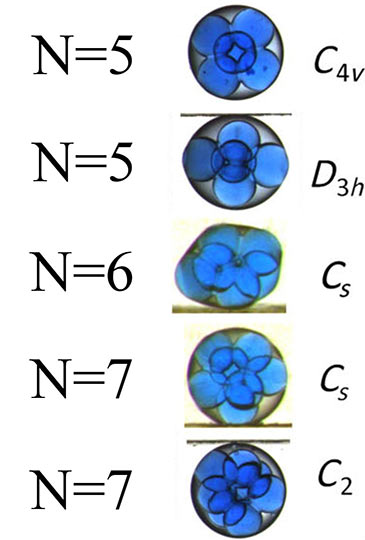The techniques developed in COPMAT will also permit to investigate the production and design a new class of exotic materials known as soft mesoscale molecules, assembled from cluster configurations of deformable oil-water double-droplets. In contrast to hard colloids, that assemble into unique configurations once the number N of colloids is specified, double-droplets with an aqueous core and oil shell prove capable of assembling new structures attaining higher packing fractions than rigid ones.
Such mesoscale molecules correspond to metastable configurations which owe their long-lived nature to the deformability of the droplets (anisotropic capillary forces) which disclose new free-energy landscapes unavailable to hard colloids. Of particular importance is a detailed computational construction of the phase diagram in the volume fraction versus the number of droplet plane (φ-N).
We shall investigate new design concepts capable of assembling larger exotic molecules than presently possible, thereby greatly facilitating the manufacturing of tissues out of such exotic molecules. We shall simulate the microfluidic setup for production of double water-oil droplets (see Figure from Guzowski, et Al., Phys. Rev. Lett. 2015, 114, 188302) and optimized variant thereof. Among the various parameters/phenomena under scrutiny to improve the current engineering design: i) long-range hydrodynamic interactions. ii) macro-geometrical parameters, iii) the ratio between the shell and core capillary energies, iv) nano corrugations.

